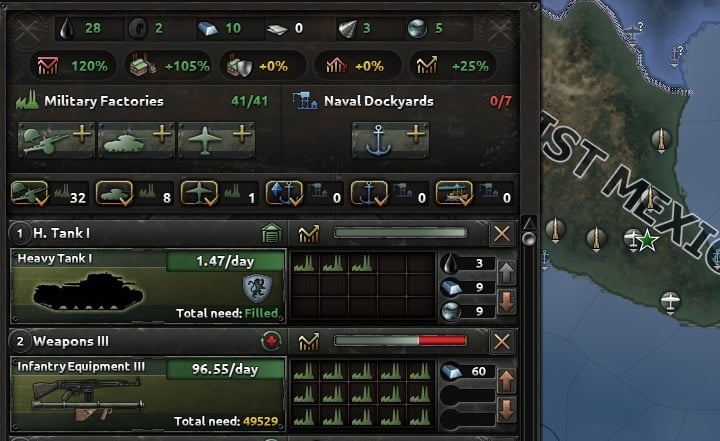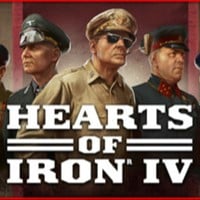Hearts of Iron 4: Production
Last update:
Production of gear is only one of the issues that are tightly connected with production of units and logistics. Only by means of proper management of each of the above, can you achieve success. In the course of production, you have to secure enough resources that you will later use for all assembly lines. The gear that you produce will be used to supply ranks of the already-existing units, or for the production of new ones. You have to monitor all logistic issues at all times, to make sure that gear you produce is not stored in warehouses and is used to satisfy current and future needs of your army.
When it comes to production, you will be able to attain high concentration of production and maintain high output through modifiers that are of key importance here.
Icon | Name | Significance |
 | Output limit | Output limit defines the threshold for production in case that an assembly line is maintained for long enough. |
 | Production capacity | Production capacity defines how much material a factory can process into army gear within an hour. |
 | Resistance to bombardment | During air raids, factories can suffer from bombardment. Your losses affect effectiveness of production. If the level of resistance is high, losses will not be as severe. |
 | Maintenance of production capacity | This factor affects maintaining of the same level of production, in situations when a given assembly line changes its project. |
 | Increase of production capacity | This factor affects the amount of additional gear that can be produced, if there are many factories involved in production of one assembly line. |
Remember that the above modifiers depend mainly on the laws you enact, your advisors and the technologies that you develop. Some of them may also have predetermined modifiers, and depending on the situation, you can either reinforce them or improve them. The key aspect of any production line is accordance with division templates. If you produce gear that you have already retired from service, due to its being obsolete, you are simply wasting the production capacity of your factories. You have to pay attention to gear that can be used by your armies.
Of course, if you are producing gear that is not covered for by templates, you will receive an immediate notification of that. The same happens if you include into a template an unit whose base gear has not been commissioned for production.

Take a look at the production panel. In its upper part, it provides you with a statistic of processing of all the available resources. The green figure specifies surplus of a material. In such situation, you have to terminate specific trade agreements as quickly as possible, as long as you are not going to open an assembly line soon.
Under values of materials, you can find the abovementioned modifiers. Their values differ, depending on your technological progression and the direction of development. Basing on specific modifiers, I will discuss issues connected with assembly lines. Let's start from the very beginning.
Assembly line is, to some extent, a binding agreement. The longer you maintain production of gear in a given line, the larger the amounts that you produce. This is what production coefficient is for. If you have been using a line for long enough, you will obtain a great increase of gear that you produce, You can compare that with a new assembly line for the same element, for the same element, with the same number of factories involved in production.
It pays off to maintain a continuous production of gear, even if you decrease the number of involved factories. Remember about this, because production of basic gear is the only way to maintain good shape of your army. In the case of assembly lines and their capacity, also hierarchy is important. The first assembly line always has the highest priority, when it comes to receiving materials. Each following line will lose access to materials if you run out. By each line, there are arrows that you can use to move around assembly lines without interrupting the production process. If you run out of materials for production of a key element, it is a good idea to move the line to the top of the hierarchy, thanks to which it becomes the first one to receive its materials and for the production to be uninterrupted.
Of course, an important element is the production capacity of a factory that affects on how many components are produced by a given factory daily. You can assign up to 15 factories to an assembly line. If your production capacity factor is high, it is a good idea to break down factories into several lines, thanks to which you can satisfy current demand for several elements, at the same time. If you introduce changes into templates, you should first focus on production of supplementary gear and additional output capacity will cover that. In such situation, it is a good idea to demote lines that produce base gear and open several new lines that gather the maximum number of factories. In such case, also "increase in production capacity" factor comes in handy. This way, you receive a bonus, if a single line uses 15 factories.
This is important from the viewpoint of combat value of your army. If you retire obsolete rifles from service, all divisions using the old template automatically become defenseless. You have to wait for all applications to replenish shortages in the army are realized, thanks to which the army can be used to its full potential.
You are not permitted to copy any image, text or info from this page. This site is not associated with and/or endorsed by the developers and the publishers. All logos and images are copyrighted by their respective owners.
Copyright © 2000 - 2025 Webedia Polska SA for gamepressure.com, unofficial game guides, walkthroughs, secrets, game tips, maps & strategies for top games.
